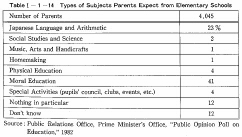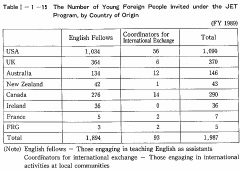| Home > Policy > White Paper, Notice, Announcement > White Paper > JAPANESE GOVERNMENT POLICIES IN EDUCATION,SCIENCE AND CULTURE 1989 > PART |
||
Elementary and secondary education aims at the formation of pupils into wellbalanced persons who are endowed with sound spirit and body to be responsible for the next generation. In order to realize this aim, efforts have been made through issuing the Course of Study which provides a standard for curriculum.
The Course of Study has been revised every ten years or so, in consideration of the development of society and the improvement of the standard of education. The last revision was made public in March 1989, covering kindergarten, elementary, lower secondary and upper secondary schools.
The Course of Study as revised in 1989 is an indicator of the
direction of elementary and secondary education in the years to come. It presents
concepts, as the principles for revision, that elementary and secondary education
of tomorrow must value. Along these concepts, major elementary and secondary
education policies may be summarized as follows.
It is necessary to enrich instructions, in moral education in the main, and in each subject and special activities as well, that cultivate well-rounded and motivated personalities.
In particular, moral education must be strengthened, with a view to cultivating morality based on wide experiences and the inner responses of pupils and to encouraging, in collaboration with families and communities, moral practices having to do with basic habits of life and human relations. Experiential learning projects such as outdoor classrooms, practical work experience and social service activities will have to be promoted to further encourage contact with nature and work.
In promoting such education, the establishment of a teaching system and the improvement of the ability of teachers are strongly needed, and related measures need to be further strengthened accordingly.

Emphasis on the cultivation of competency for independent learning is necessary, in view of the need to independently respond to changes in society. Accordingly, the basis of education must be placed on the cultivation of the ability to think, judge and express ideas, while emphasis on logical thought, imagination and insight is necessary for building the foundation for creativity.
Also with a view to forming a basis for lifelong learning. emphasis must be placed on experiential learning and problem solving learning, and it is also important to have pupils feel the joy of learning and the sense of accomplishment, to stimulate the motivation to learn and to have them aquire methods for independent learning.
In response to the development of information oriented society,
cultivation of the ability to understand, choose, handle and create information,
as well as the ability to properly handle information media such as a computer
must be emphasized. Therefore, in accordance with the levels of development of
pupils and with the nature and character of academic subjects, the cultivation
of these abilities, the installment of computers and other necessary facilities
and their effective use in education must be promoted.
Throughout the process in which each pupil firmly grasps basic knowledge, care must be taken to make education instrumental to developing individual traits of pupils. For that purpose, a change of view in education is necessary whereby individual traits of pupils are recognized and these various good aspects are allowed to grow. It is also necessary to improve teaching methods responding to individual needs, for example, through the improvement of learning modes and systems of teaching, research in and the development of teaching materials, the undertaking of evaluation in the process of teaching and the use of educational tools and machines. At lower secondary and upper secondary school, the increase of elective subjects with consideration for the diversity of students is necessary.
In order to realize education for developing pupils' individual
traits, innovation at school as mentioned above must be accompanied by the improvement
of the conditions of educational environment.
In response to the development of internationalization, and in view of the need to cultivate Japanese people who can manage to live independently in international society, understanding of history and culture of foreign countries must be deepened,and international understanding must be promoted, while at the same time an attitude to appreciate culture and tradition of Japan must be cultivated. To this end, teaching the Japanese language and Japanese history must be strengthened. Teaching about the national flag and national anthem must be emphasized, in order to foster a sense of Japanese and love for our country and thus to bring up a Japanese who can earn respect from the international community. Regarding foreign language education, emphasis must be placed on the ability to communicate. As a means to promote linguistic instruction by native speakers, the "Japan Exchange and Teaching Program (JET) " - a program for inviting young foreign people as assistant foreign language teachers - and programs of sending teachers of English abroad must be further promoted.

| Back to Top | MEXT HOME |